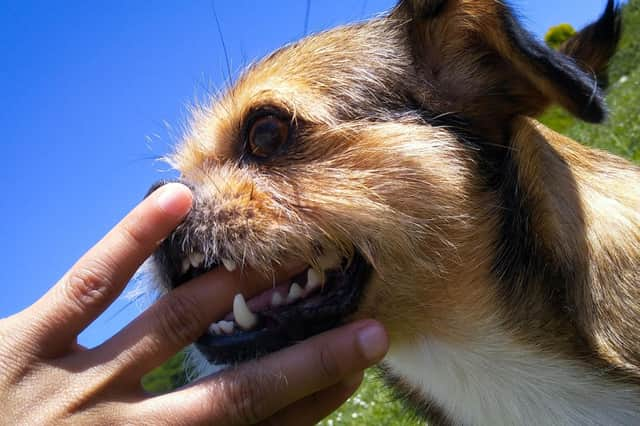Dog Bites: Why dogs bite, how to avoid it from happening and what to do about aggressive behaviour 🐶


With dog bite-related hospital admissions reported to have increased by almost a third over the decade, it’s very easy to oversimplify and judge the dog and owner. However, the truth is that many dogs who bite are well cared for pets.
Understanding the intricacies of canine behaviour and addressing the triggers behind bites is instrumental in creating a harmonious relationship between humans and our four-legged companions.
Advertisement
Hide AdAdvertisement
Hide AdSophie White, Veterinary Behaviourist at Agria Pet Insurance, has shared her knowledge on dog bites, including tips for how owners can spot the signs and prevent their dog from lashing out.
She explained: “Owning a dog is a big responsibility, and it requires more than just providing food and shelter. Dogs also need socialisation, exercise, and proper training. As dog owners, we must be willing to invest time and effort in our pets to ensure they are well-adjusted and happy. Additionally, it's important to educate ourselves and those around us about responsible dog ownership. This includes teaching children how to interact with dogs, avoiding confrontations with unfamiliar dogs, and being aware of our dog's body language and signals."
She added: “While dog bites can be a serious issue, it's important not to oversimplify and judge. There are no bad dogs, only dogs that need guidance and help. As a society, we must learn to read and understand our dogs' body language, respond appropriately to their needs, and seek help if necessary. By taking responsibility as pet owners and promoting responsible dog ownership, we can reduce the number of dog bites and create a safer environment for both humans and animals.”
Here's what she had to say.
Why do dogs bite?
Rather than looking for who to blame when there’s been a biting incident, it’s more important to think about the contributing factors. Serious dog bites almost always occur due to a breakdown in communication, typically when a dog wants space and this is not provided.
How to avoid dog bites
Reading body language and understanding what dogs are trying to express, as well as responding appropriately when this occurs, is vital. Confronting a dog showing aggression, and refusing to increase distance, means that the dog is more likely to escalate that behaviour in the future. It’s important to remember that dogs don’t bite out of malice; they bite out of necessity and an inability to cope with their situation. Scared and frustrated dogs are far more dangerous than those that feel safe and secure.
Does the breed of dog matter?
Every dog should be treated as an individual, no matter the size or breed of dog. Breed does not predict the likelihood of a bite, but it will influence the likely outcome. With many serious dog bites there is a dangerous combination of vulnerable individuals such as children or the elderly and large breed dogs with minimal training and novice owners. It is vital to acknowledge that all dogs can and may bite. Some could cause more serious damage than others. Despite portrayals, there are no inherently ‘dangerous dogs’.
What to do if a dog is showing signs of aggression
There are several steps an owner can take to address any current issue and prevent future incidents. The first step is to consult with a veterinarian to rule out any medical conditions that may be causing or contributing to your furry friend’s aggressive behaviour. If a medical issue is ruled out, a vet may recommend a certified professional dog trainer or a veterinary behaviourist who can work with the dog to address the root cause of the behaviour and develop a behaviour modification plan. It is important to note that aggressive behaviour in dogs is not a reflection of their character or personality, but rather a sign that they are experiencing stress, fear, or anxiety. With patience, persistence, and the right professional guidance, it is possible to modify a dog's behaviour and create a safe and harmonious relationship between an owner and their furry friend.
Comments
Want to join the conversation? Please or to comment on this article.